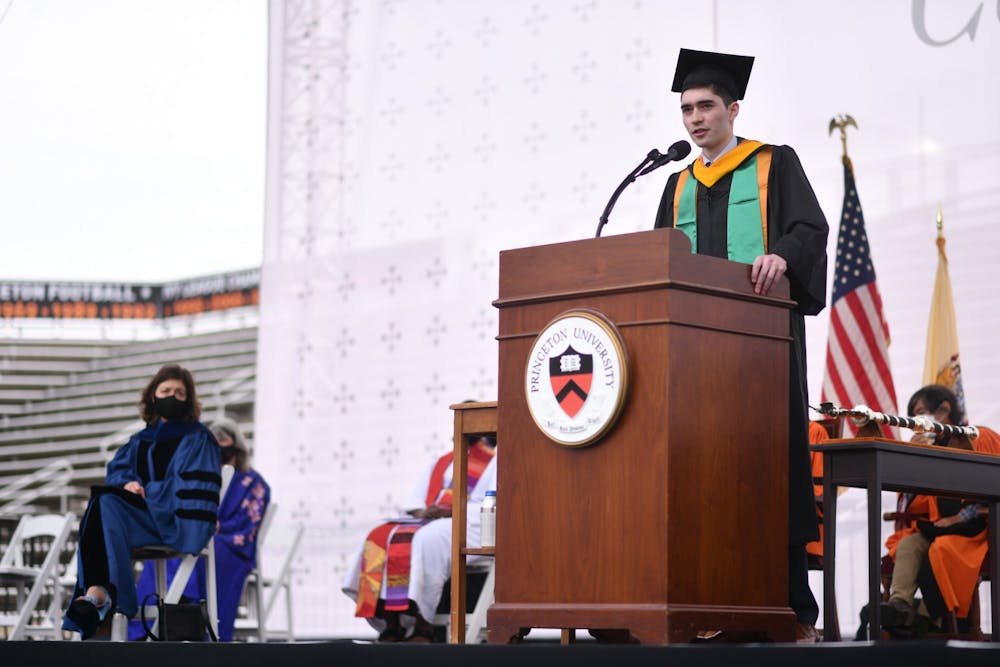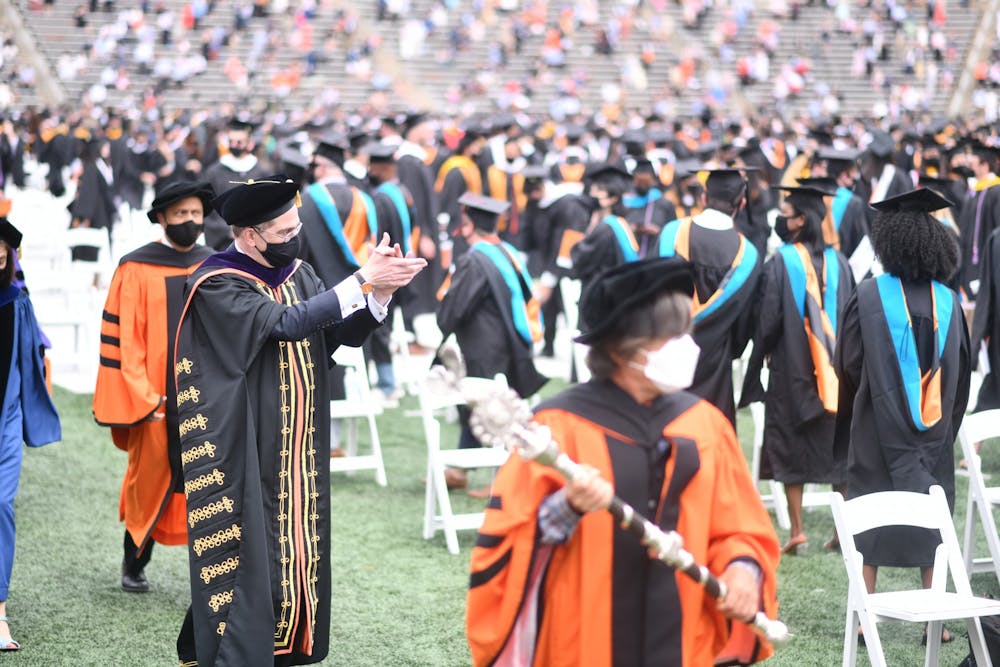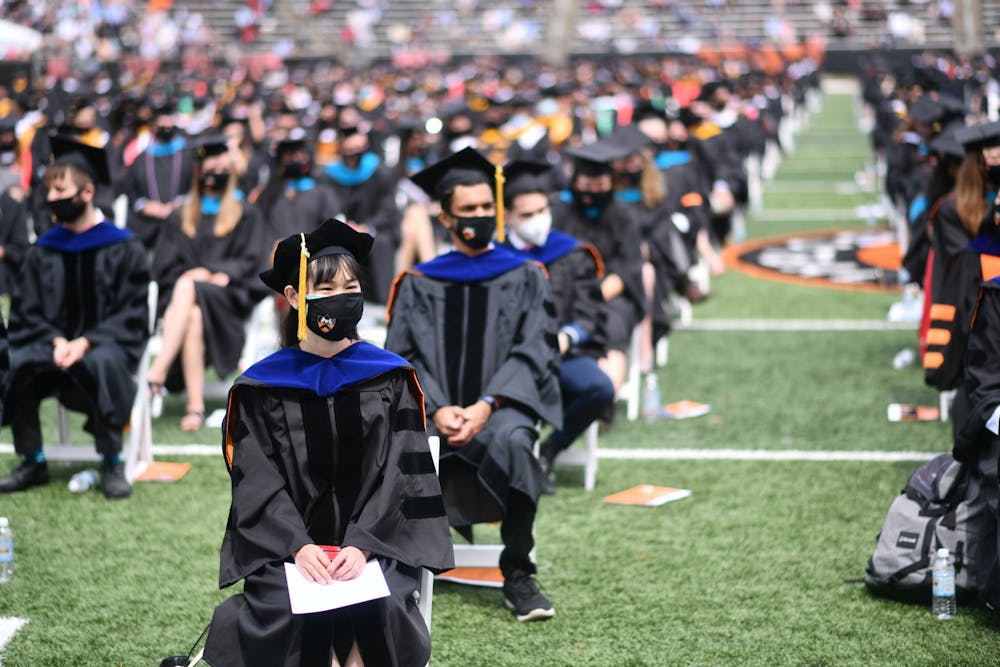In a unique Commencement ceremony distinctly marked by the COVID-19 pandemic, thousands of University students, faculty, staff, and their families gathered at Princeton Stadium to celebrate the Class of 2021 on Sunday.
Woven into the more typical pieces of the ceremony like the salutatory address, presentation of undergraduate and advanced degrees, and granting of honorary degrees were numerous reflections on what the past 14 months under the pandemic have meant for the University community.
In his speech, Valedictorian Taishi Nakase ’21 reflected on the emotions and complex connections brought about by the pandemic. He emphasized the shared experience of the past year, even as we were physically separated.
“Whether we know it or not, we shared in this aloneness together,” he said.

Taishi Nakase at Princeton University 2021 Commencement
Charles Sykes / Associated Press Images for Princeton University
Nakase pointed out that the commonness of many students’ emotions of pain and loss do not make them less significant. “Our moments of loneliness, grief, and even private joys ought to be recognized, for they can and should move us,” he said.
He quoted a George Eliot passage about how people often do not sympathize with those going through common griefs or tragedies, though they feel significant to the person experiencing them.
“If we had a keen vision and feeling for all ordinary human life, it would be like hearing the grass grow, and the squirrel's heartbeat, and we should die of that roar which lies on the other side of silence,” Eliot wrote.
Just because the everyday difficulties of students during the pandemic are not always acknowledged, does not mean that they are not important, Nakase explained. “Our disappointment at the loss of all those things we have come to think of as our due, the annoyances of Zoom classes, the uncertainty of our futures, and even my unexpected time with my father, constitute an epic, as good as any,” he said.
In this vein, Nakase encouraged everyone to foster their sympathy for one another, “sympathy that not only turns towards grand historical things, and game changing research, but stretches forth to the ordinary acts and feelings of individuals that too often go unremembered and unnoticed,” he said.
He also explained the importance of not losing sight of sympathy in the race to do “grand things” at an Ivy League university.
“I know there is pressure to do grand things. I feel it too. I don't think I would be here otherwise,” he said. “Sometimes what is required of us, however, is not to change the world, but rather to recognise what is extraordinary in the ordinary tragedies of our lives, and those of others, and try to honour those small, simple acts of kindness that can have so great an effect on those around us. As we find our feet in this new chapter in our lives, I hope that we can develop the courage to hear the roar which lies on the other side of silence.”

Nakase also addressed the experience of being a first-generation college student and his unexpected return home to Melbourne, Australia. Before the COVID-19 pandemic hit, Nakase was unsure of when he would return home.
“I was determined to carve out my own path, and build the life that my father was denied, but had always wished for me, a life not constricted by financial struggle or the limitations of an unfinished education,” he said.
The pandemic upended his expectations of his college experience and merged his personal life and academic interest in infectious diseases, but Nakase reflected on the moments of unexpected joy he found during the pandemic, especially having dinner with his dad.
At the University, Nakase concentrated in Operations Research and Financial Engineering. He is pursuing a Master of Science in Modeling for Global Health at Oxford University next year and then plans to attend medical school.
Salutatorian Lucy Wang ’21 delivered her speech in Latin and the accompanying written translation celebrates the resilience of the Class of 2021 during the pandemic.
“Although we departed these halls last spring, and we were tossed through the lands and seas, look at how far we have come,” it read.
The ceremony began with an invocation from Dean of Religious Life and of the Chapel Alison L. Boden addressing the trials and growth caused by COVID-19.
“As we come towards the end of a most trying time, of losses of many kinds, of dear ones gone, life plans rerouted, precarities, anxieties, griefs, let us know ourselves to be walking through an annus mirabilis,” she said. “A year of wonders, of friendships whose constancy cannot be shaken, loves that endure even beyond the grave, cries for justice, that grow in power, of compassion shown to the stranger, and beauty discovered within fragility and loneliness, of strength and resilience rewarded in a stadium.”
Before conferring undergraduate degrees, Dean of the College Jill Dolan also spoke to the persistence of the graduating class.
“I am especially grateful for the class of 2021's commitments during these past 15 months, your last at Princeton. You worked hard to maintain the academic and social community we so prized, even when circumstances might have conspired to break our bonds apart,” she said.

President Christopher Eisgruber at Princeton University 2021 Commencement
Charles Sykes / Associated Press Images for Princeton University
In his speech, President Christopher Eisgruber ’83 acknowledged the disparities in COVID-19’s effects across racial, economic, and geographic groups, and expressed what he perceives as the need to dedicate ourselves to social justice.
He further discussed how the required use of technology over the past year has challenged the notion that we need physical connection to have intellectual connection.
But, Eisgruber concluded, “To forge a common good together, we must break bread together. We must, in other words, relate to one another, not just as disembodied intellects, interests, or ideologies, or as faces in zoom boxes, but also as real three dimensional people who share basic needs, and a common humanity.”
“As you venture forth beyond this campus, I hope you will seize the opportunity to build the genuine community that we so urgently need,” he said.
Early in the ceremony, Eisgruber held a moment of silence for two community members lost this year, Kevin Chang ’23 who passed away in April and Cassidy Yang, a fifth-year graduate student in Quantitative and Computational Biology who passed away following a car crash this winter.
Eisgruber noted that the Commencement was representative of the past year.
“We are together gathered through creative planning, technological assistance, the tireless work of many people, and a fierce determination to mark with physical presence this important moment in your lives,” he said.
Yet, even those physically present needed to stay distanced, and many could not come at all.
Since 1922, University Commencement has been held in front of Nassau Hall, barring weather constraints. This year’s ceremony took place on the larger Princeton Stadium to accommodate for social distancing guidelines.
Graduating seniors were all invited to attend the ceremony, regardless of whether they had been on the University’s testing protocol or social contract. They were each allowed two guests.
Attendees were required to wear masks, and ushers ensured that people were going through their designated entrances to promote social distancing. The event was live-streamed for those unable to attend, and it had over 6,000 views at the time of publication.
Graduate students receiving Masters degrees or PhDs were also recognized by Acting Dean of the Graduate School Cole M. Crittenden, and Dean of the Faculty Sanjeev R. Kulkarni presented the President’s Award for Distinguished Teaching to four faculty members.
One student said of award-winner Professor of Astrophysical Sciences Neta Bahcall that “she has a willingness to push her students but it never overshadows her ability to build their confidence and self worth. She has shown me that I can really be it all, partner, mother, mentor, friend and renowned scientists and that no roles are mutually exclusive.”
Professor of Molecular Biology Elizabeth Gavis has added increasingly important courses to the department and was praised for sharing a collaborative intellectual environment.
Award-winning Professor of Creative Writing James Richardson was described as “a remarkable poet, colleague and teacher and a person of deep warm, profound intelligence and genuine affability,” by Chair of the Lewis Center for the Arts Tracy K. Smith.
Students and faculty described Assistant Professor of Politics and the School of Public and International Affairs Rory Truex as exceptionally dedicated to his work and his students through advising and class interactions.
Alumni Trustee and ABC13 reporter Melanie C. Lawson ’76 presented several honorary degrees through pre-recorded videos.
Honorary degrees went to musician and philanthropist Jon Bon Jovi, leader in New Jersey higher education Linda Caldwell Epps, University Professor Emeritus John V. Fleming, scientist and former New Jersey Congressman Rush Holt, doctor and public health expert Risa Juanita Lavizzo-Mourey, and HomeFront founder Constance Mercer Myers.
During the ceremony, Provost Deborah Prentice recognized four secondary school teachers in New Jersey for their exceptional teaching. They were Dr. Mina Armani, Jametta P. Clarke, Christine Lim, and Andrew Teheran.
“In so doing, we gratefully acknowledge the exceptional contributions of our colleagues who teach in high schools and middle schools,” Prentice said.
The Commencement ceremony aptly ended with a recording of the University Glee Club singing the alma mater, Old Nassau.
The processional began at 10:30 a.m. on Sunday, May 16, and the ceremony began at approximately 11 a.m. All speeches were accompanied by an ASL interpreter projected on screens in the stadium. Commencement was preceded by Baccalaureate and Class Day on Saturday, May 15.








